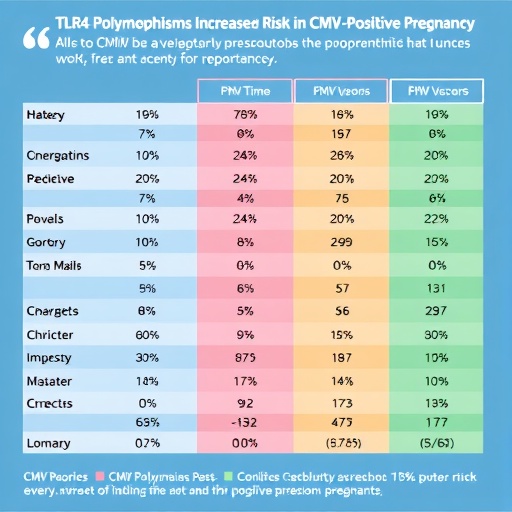
In a groundbreaking study emerging from Boston Universityâs Chobanian & Avedisian School of Medicine, new insights have been uncovered regarding the complex relationship between dietary protein intake and cancer-associated venous thromboembolism (VTE). VTE, a dangerous clotting disorder frequently observed in cancer patients, represents a major cause of mortality, second only to cancer progression itself. The latest research demonstrates that diets high in the essential amino acid tryptophan substantially heighten the risk and severity of VTE in experimental cancer models, a finding that could carry significant implications for nutritional management in oncology.
Cancer survivors are a growing demographic worldwide, yet they face the compounded threat of cardiovascular diseases, which remain a leading cause of death in this population aside from cancer recurrence. According to an extensive review of the Surveillance, Epidemiology, and End Results database, individuals surviving cancer face disproportionately high rates of death due to blood clotting events associated with VTE. This disorder, characterized by the formation of clots in veins, poses a particular threat to cancer patients, with a risk that is four to seven times higher than that of the general population. The fatality rate associated with cancer-related VTE is alarmingly high, killing about one in every seven affected patients.
Despite extensive research into dietary fats and their role in cancer and cardiovascular illnesses, the impact of protein-rich dietsâspecifically those enriched with tryptophanâon thrombosis in cancer has remained underexplored. This amino acid, abundant in many protein sources, has now emerged as a pivotal factor influencing thrombogenic processes in the context of malignancy. The Boston University study probed this link using well-established animal models of colon cancer, uncovering that elevated intake of tryptophan drastically exacerbates the formation and progression of venous clots compared to animals maintained on balanced diets.
Building upon these observations, the investigators focused on the enzymatic pathways implicated in tryptophan metabolism. They identified that the inhibition of a key enzyme, indoleamine 2,3-dioxygenase 1 (IDO1), responsible for degrading tryptophan, attenuated the severity of vascular injury in their models. This pivotal discovery highlights a crucial biochemical axis by which dietary tryptophan influences coagulation and thrombosis. Further biochemical analyses revealed that kynurenine, a metabolite downstream of tryptophan degradation through IDO1, acts as a modulator of coagulation factors, thereby promoting the hypercoagulable state observed in cancer-associated thrombosis.
These findings suggest an intricate interplay between amino acid metabolism and vascular pathology in oncology patients. Nutritional recommendations often advocate for elevated protein intake in cancer patients to counteract cachexiaâa wasting syndrome marked by muscle and weight loss that drastically undermines patient strength and treatment tolerance. Such nutritional strategies frequently include parenteral nutrition, which can supply tryptophan in quantities far exceeding standard dietary levels. This study raises critical questions about the unintended pro-thrombotic consequences of such interventions and underscores the need to carefully balance anabolic support against thrombosis risk.
Clinically, the implications of this research are far-reaching. It prompts a reevaluation of dietetic protocols in cancer care, particularly concerning protein supplementation strategies. If high dietary tryptophan indeed fuels thrombogenic pathways through IDO1-mediated metabolism, then targeted inhibition of this enzyme or careful dietary modulation could serve as adjunctive approaches to diminish the burden of VTE in cancer patients. While the current data are derived from animal models, the translational potential beckons clinical trials to ascertain whether similar mechanisms pertain in humans and how best to mitigate these risks without compromising nutritional status.
From a molecular perspective, this study elucidates the dual role of metabolic molecules in cancer biologyânot merely as nutrients but also as active modulators of pathophysiological pathways involving vascular injury and coagulation. The kynurenine pathway has been increasingly recognized for its immunomodulatory and pro-inflammatory roles in tumor microenvironments. This work further integrates thrombosis into the multifactorial impact of tryptophan metabolism, suggesting that metabolic targeting could synchronize with anti-cancer and anti-thrombotic therapies.
The ramifications extend beyond individual patients to public health considerations. As cancer survival rates improve globally, long-term management of co-morbidities like thrombosis and cardiovascular disease becomes critical. Nutritional management, often a neglected aspect of oncology care, emerges here as a potential modifiable factor influencing survivorship quality and longevity. Such insights bolster the rationale for interdisciplinary approaches combining oncology, hematology, nutrition, and vascular medicine to optimize patient outcomes.
Furthermore, the studyâs innovative use of experimental models offers a robust platform for unraveling the metabolic underpinnings of cancer-associated coagulopathies. The demonstration that enzymatic modulation can alter the trajectory of vascular thrombotic events suggests novel therapeutic targets. Specifically, IDO1 inhibitorsâcurrently explored in cancer immunotherapyâmay have dual benefits in mitigating thrombosis, positioning them as attractive candidates for integrated cancer care strategies.
This research also challenges the traditional paradigm separating nutritional biochemistry from vascular pathology, highlighting how dietary components can influence complex systemic processes such as coagulation. The evidence encourages deeper investigation into how protein metabolism intersects with other risk factors to shape thrombosis susceptibility in cancer, potentially identifying biomarkers for personalized dietary guidelines.
The publication of these findings in Blood Advances underscores the urgency and novelty of this area of investigation. Funded through prominent cardiovascular and thrombosis research grants, including support from the American Heart Association and Boston Universityâs dedicated vascular pathology centers, this study reflects a convergence of expertise and resources aimed at addressing one of oncologyâs most lethal complications.
Ultimately, advancing our understanding of dietary tryptophanâs effect on venous thrombosis not only enriches our knowledge of cancer pathophysiology but also spotlights the critical role of metabolism in the interplay between nutrition and disease. As this line of research unfolds, it holds promise for refining dietary recommendations, developing metabolic interventions, and improving survival outcomes for the millions of cancer survivors worldwide who remain vulnerable to cardiovascular threats.
Subject of Research: Animals
Article Title: Dietary Tryptophan Augments Cancer-Associated Venous Thrombosis Mitigated by Indoleamine 2,3-Dioxygenase 1 Inhibition
News Publication Date: 16-Jul-2025
Keywords: Health and medicine, Health counseling
Tags: Boston University cancer research findingscancer survivor health challengescancer-associated blood clotting disorderscardiovascular risks for cancer survivorsdietary implications for cancer treatmentdietary protein intake and thromboembolismessential amino acids and cancer outcomeshigh-protein diets and cancer risknutritional management in oncologytryptophan-rich foods and venous thromboembolismvenous thromboembolism risk factorsVTE mortality in cancer patients




